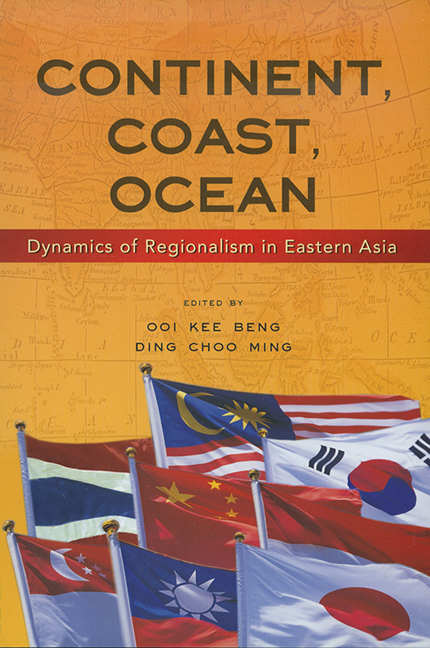Introduction
Historical Conditions of Regionalism in Eastern Asia
Published online by Cambridge University Press: 21 October 2015
Summary
HISTORICAL CONDITIONS OF REGIONALISM IN EASTERN ASIA
Research on East and Southeast Asia generally follows the common practice of focusing on nation states. Where this proves unsatisfactory (and this happens increasingly often), scholars resort to frameworks such as regional studies or “area studies” as alternatives, or phrase issues that are relevant to geographic regions beyond national boundaries. Where East Asia is concerned, national borders have remained more useful as boundaries for academic disciplines than they have been where Southeast Asia is concerned.
The geo-political “leftover” that is Southeast Asia consists of a political and cultural plethora beyond what one would expect, given its relatively small land surface. The predominantly maritime nature of human contacts in the region, especially in the south, is the main reason for this. Southeast Asian studies, therefore, is a regional discipline by nature, where the region's national policies must necessarily consider inter-cultural dynamics throughout maritime Asia from India to Japan. In fact, “culture” as understood in Southeast Asia assumes inter-cultural dynamics and hybridity to a larger extent than in continental regions such as East Asia.
Historical traditions in East Asia, influenced as strongly as they were by the bureaucratic class, have generally been about domestic order and barbarian invasions. This prolonged prejudice has allowed the history and reality of inter-state trade and communication through the ages to be overshadowed by central perspectives. However, wide-ranging extra-political factors were always significant, and exerted an influence that cannot be denied. In the case of China, the centre of its culture and its economy had been moving steadily southwards throughout the centuries under pressure from northern peoples pushing across porous boundaries. The inter-cultural exchanges involved and how they have in fact impacted on Chinese civilization and politics are not widely known. This southward movement was to an extent slowed in the fourteenth century by the usurping third monarch of the Ming Dynasty (1368–1644), the Yongle Emperor (reign period 1403–24), when he moved the imperial capital, which had shown a tendency to shift eastwards and southwards since the Tang Dynasty (618–907), if not already during the Later Han (25–220), to his own power base in Beijing, one of the traditional capitals of non-Chinese dynasties in the north, including the Yuan Mongols.
- Type
- Chapter
- Information
- Continent, Coast, OceanDynamics of Regionalism in Eastern Asia, pp. xiii - xxivPublisher: ISEAS–Yusof Ishak InstitutePrint publication year: 2007



